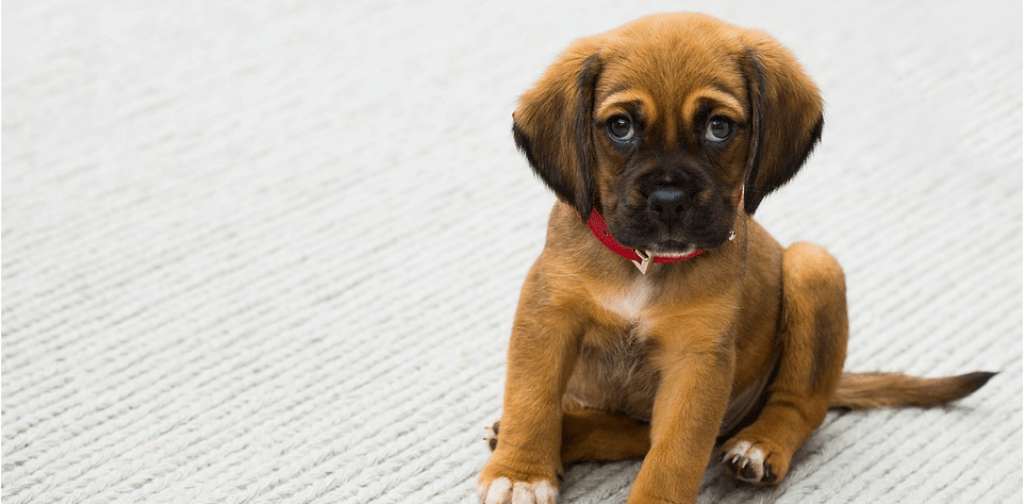
House training your puppy is one of the most important – and potentially frustrating – parts of having a puppy or new dog in the house. Soiling the house is among the top reasons dogs lose their homes and end up in a shelter, so teaching your puppy how to successfully go outside is one of the most important skills you can teach them.
First, the don’ts.
- Don’t spank, yell or get upset when your puppy has an “accident.” Your puppy will not understand why you are upset and will only become afraid of you. Stay calm and take the appropriate steps so that you can give positive reinforcement.
- Don’t rub your puppy’s face or nose in their urine or feces. Puppies are not intellectually capable of connecting your anger with their accident.
- Don’t leave your puppy outside alone, at least until he or she is trained. Always carry or walk with your puppy outside and stay with them until they go.
- Don’t ignore your puppy when he or she is giving you signals that he or she may need to go. The idea is to “catch” them when they need to go and get them outside as soon as possible so they learn where you want them to go.
- Don’t rush your puppy when they’re outside. Give them all the time they need to be successful.
- Don’t give your puppy free reign in the house until you can trust them to go outside. You may need to restrain your puppy to a small area and continue to give them more freedom as you can trust them.
- Don’t use a crate if your puppy is eliminating in it. There are several reasons this could be happening, such as the puppy having learned this behavior at a shelter, not getting enough outside time, the crate being too big or the puppy not being old enough to “hold it.”
Now, the do’s.
- Do visit the breeder, if possible, to learn about the habits and behaviors your puppy has before you bring him or her home.
- Do wait to start house training until your puppy is between 12 and 16 weeks old. At that point, he or she will have enough control to be successful.
- Do learn your puppy’s cues that he or she needs to go. Whining, circling, sniffing, barking, getting active or scratching at the door are common signs that your puppy needs to be taken outside immediately.
- Do give them a treat or positive verbal reinforcement whenever your puppy is successful.
- Do be patient. It takes time for your puppy to learn what is expected, as well as be old enough to hold their bladder and bowels for very long. It usually takes about 4-6 months for a puppy to be fully house-trained, and some dogs may take up to a full year.
- Do expect setbacks. As long as you stick to regularly taking your puppy out on a schedule, he or she will figure it out.
- Do confine your puppy to a defined space, such as a crate or a room with a baby gate, until he or she learns to maintain control between outings.
- Do keep your dog on a regular feeding schedule, and take away food between meals. You should take your pup out within 30 minutes of eating as this is a natural time for them to need to go out.
- Do have someone give your puppy a break if you can’t let them out often during the day.
- Do take your puppy out first thing in the morning or when he or she wakes up from a nap, when he or she naturally has to go.
- Do take your puppy to the same area of the yard to do his or her business as the scent will help prompt your puppy to go.
- Do clap loudly if you catch your puppy in the act, so he or she knows they have done something unacceptable. Then take them outside and let them finish. Give them a treat right away when they are successful.
- Do clean up accidents with an enzymatic cleanser. This type of a cleaner will minimize odors that might attract your puppy back to the same area.
If you need to work all day or be away from your puppy for long periods, consider enrolling him or her in daycare. Daycare at Canine Campus offers many benefits, such as preventing boredom, relieving separation anxiety and loneliness, and making sure your puppy gets lots of exercise and attention. Dogs are social animals and need to interact with other dogs; daycare is a good way for your dog to gain confidence and social skills with other dogs.
As soon as your puppy has had all of the necessary vaccinations, including bordetella, distemper and rabies, he or she is ready for an Admissions Test to see if they are a good fit for daycare. Call us at 719-448-9600 or contact us here to set up a visit at Canine Campus. We’d love to meet you and your precious puppy!













Leave a Reply